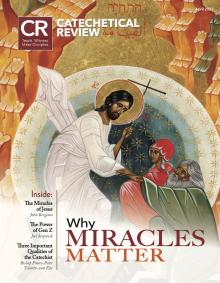 In a 1978 Lenten catechesis given in Munich, then-Cardinal Joseph Ratzinger spoke of the eucharistic mystery as an incomparable encapsulation of Christ’s transformative self-gift, whose meaning is best expressed in the act of washing his disciples’ feet: “He, who is Lord, comes down to us; he lays aside the garments of glory and becomes a slave . . . he bends down to our dirty feet, to the dirt of humanity, [and by] his greater love he washes us clean.”[1] Christ’s freely chosen self-abasement is the work of love that restores us and prepares us to sit down together at table, to enter into the banquet of the kingdom that is nothing less than full communion with God and with one another. We are “washed through our willingness to yield to [Christ’s] love” and “able to be with God.” [2]
In a 1978 Lenten catechesis given in Munich, then-Cardinal Joseph Ratzinger spoke of the eucharistic mystery as an incomparable encapsulation of Christ’s transformative self-gift, whose meaning is best expressed in the act of washing his disciples’ feet: “He, who is Lord, comes down to us; he lays aside the garments of glory and becomes a slave . . . he bends down to our dirty feet, to the dirt of humanity, [and by] his greater love he washes us clean.”[1] Christ’s freely chosen self-abasement is the work of love that restores us and prepares us to sit down together at table, to enter into the banquet of the kingdom that is nothing less than full communion with God and with one another. We are “washed through our willingness to yield to [Christ’s] love” and “able to be with God.” [2]
The Sacrament of the Eucharist is the continuation of Christ’s work as “the way, the truth, and the life” (Jn 14:6), received first in our faith-filled consuming of this divine food (which is at once Christ’s loving surrender to the Father on Calvary) and then in our loving and attentive adoration of the One who remains with us. In Christianity, God who “goes in search of man” desires a personal encounter with each man and woman as a chosen son or daughter of God and an heir by the grace of the Holy Spirit.[3] God is never content with a worship that is merely the “exchange of ideas,” a religion of consoling insight; rather, he wills to save us by a real, transforming encounter with his presence leading us to love as he does. Physical contact and communion with the Incarnate Word in the pews among our brothers and sisters is desired by God as most fitting for our mode of being: persons with a body and a soul. So, while respecting those unable to attend Mass due to illness or infirmity due to advanced years, and knowing that God provides as we are unable, the unforced choice to watch a YouTube broadcast of one’s favorite preacher rather than physically attending the Holy Mass fails to rise to the level of the encounter God seeks or the manner of worship he desires.
The gift of the Sacrament of the Eucharist testifies to God’s longing for communion with our whole person. Our salvation is born of a relationship with our Savior who (for love of us) now possesses a human body and soul and desires to encounter us likewise. Beyond any of the present “horizontal-bound,” reductive ideologies that promote human “freedom” as unrestrained self-potentiality (especially concerning the body), yet which fail to address the God-sized longing of the human heart, God offers us in Jesus “integral salvation . . . which embraces the whole person,” the discovery of our true identity as sons and daughters of God.[4]
If there is anything so longed for in our present world, especially among the young, it is to know who we truly are and the purpose for which we exist. Beyond the daily cacophony of voices that cry out for attention and demand conformity and acceptance, at the threat of our being shunned, Jesus alone has “the words of eternal life” (Jn 6:68). And he continues to summon us, in the Sacrament of the Eucharist, to “come to [him] to have life” (Jn 5:40).
For this reason, in the Eucharist Jesus “becomes for us the food of truth.”[5] Wonderfully stated, Pope Benedict XVI wrote, “Jesus is the lodestar of human freedom: without him, freedom loses its focus, for without the knowledge of truth, freedom becomes debased, alienated and reduced to empty caprice. With him, freedom finds itself.”[6] Through regular contact with Jesus in the Eucharist, we are drawn into his self-gift; we are tasked with “entering into his ‘hour,’”[7] wherein we discover the true purpose of our life—that our happiness is found only through the sincere gift of ourselves in union with him.[8]
Very Rev. Michael Berry, OCD, is the provincial superior of the Immaculate Heart of Mary Province of Discalced Carmelite Friars, which includes the East Coast and Upper Midwest.
Notes
[1] Joseph Ratzinger, God Is Near Us: The Eucharist, the Heart of Life, ed. Stephan Otto Horn and Vinzenz Pfnür, trans. Henry Taylor (San Francisco: Ignatius Press, 2003), 30.
[2] Ratzinger, God Is Near Us, 31.
[3] See John Paul II, Tertio Millennio Adveniente, 7
[4] John Paul II, Redemptoris Missio, 11.
[5] Benedict XVI, Sacramentum Caritatis, 2.
[6] Ibid., quoting his “Address to Participants in the Plenary Assembly of the Congregation for the Doctrine of the Faith” (10 February 2006): AAS 98 (2006), 255.
[7] Benedict XVI, Sacramentum Caritatis, 11.
[8] See Second Vatican Council, Gaudium et Spes, 24.
This article originally appeared on page 13 of the printed edition. USCCB National Eucharistic Revival Logo.
This article is from The Catechetical Review (Online Edition ISSN 2379-6324) and may be copied for catechetical purposes only. It may not be reprinted in another published work without the permission of The Catechetical Review by contacting [email protected]

















